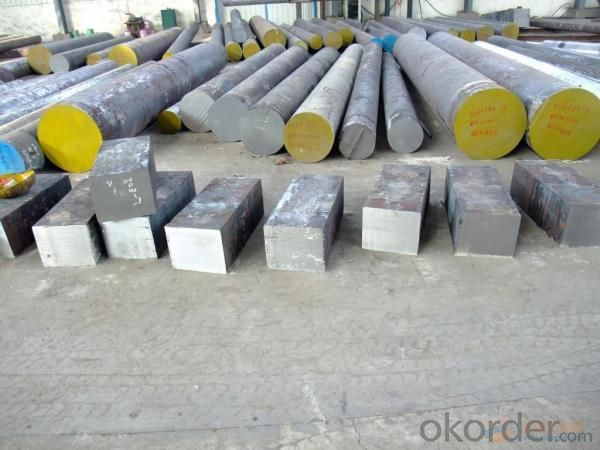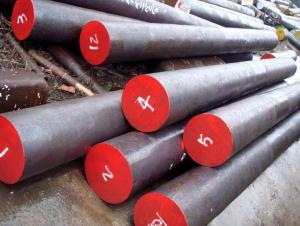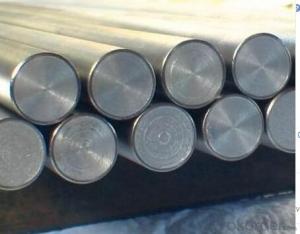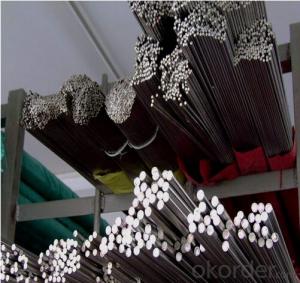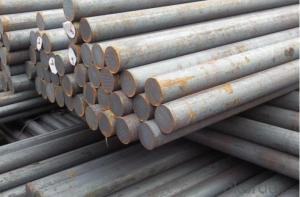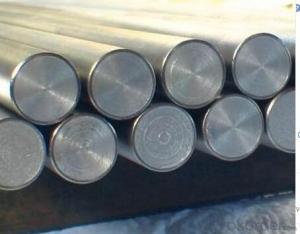Bearing Steel GCr15
- Loading Port:
- China Main Port
- Payment Terms:
- TT or LC
- Min Order Qty:
- 50MT m.t.
- Supply Capability:
- 500000tons/YEAR m.t./month
OKorder Service Pledge
OKorder Financial Service
You Might Also Like
Specifications of Bearing Steel GCr15
1. Dimensional sizes: Thickness: 14~100mm.Length:3000~5800mm,Diameter :14-500mm
2.Chemical composition:
C | Si | Mn | Cr | Ni | Cu |
Equal or less than | |||||
0.95-1.05 | 0.15-0.35 | 0.20-0.40 | Cr:1.30-1.65 | 0.30 | 0.25 |
3. Grade: SAE51200/ GCr15 / 100cr6
4. Heat Treatment:
Soft annealing: heat to 680-720°C, cool slowly.
Hardness after annealing: Max. 241 HB
Hardening: 820 - 850 °C
Normalizing temperature: 840-880°C
Tempering: 540-680°C
5. Surface requirements: Black, grinding, bright, polish
6. Characters:
1) Comprehensive properties
2) Good performance in cutting and processing after spheroids annealing
3) High hardness and homogenization after quenching and tempering
4) High abrasive resistance and fatigue resistance
7. Payment terms: T/T or L/C at sight
Usage & Applications of Bearing Steel GCr15
Our products have been used in all kinds of areas, such as aviation, aerospace, navigation, nuclear, energy, chemical industry, electronic information, petrochemical, automotive, instrument and meter, Communication ,transportation, and medical instruments, etc. Bearing ring,steel rolling mill ,machinery, 100Cr6 bearing steel ball is widely used in high-speed and low-noise bearing, bicycle, motorcycle, automobile, bags, electronics.
Packaging & Delivery of Bearing Steel GCr15
Mark: Heat No. will be cold stamped and Steel grade, diameter (mm), length (mm), and the manufacturer LOGO and weight (kg) is painted.
Standard seaworthy packing or as customer required
Delivery time: Within 30 days after order is confirmed.
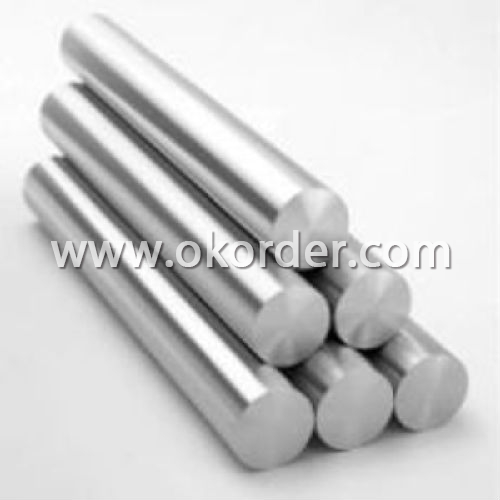
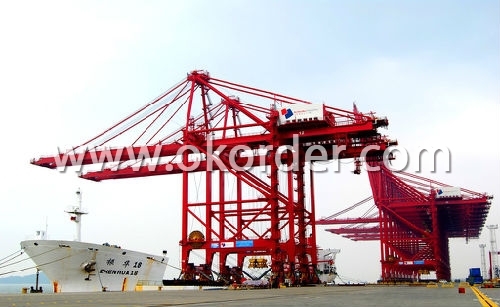
Note:
1. According to national standard (GB) for our products, if not, supply according to national standards (GB) or agreement.
2. We can not only provide electric furnace +LF+VD and electro-slag re-melting (ESR)steel forging materials, but also forging products of piece, bar, etc.
3. Our company is equipped with roll equipment and can provide our customers with roll billets or finished.
4. Please send us your detailed specifications when inquire. We will reply to you ASAP.
- Q: What are the properties of precipitation-hardening steel?
- Precipitation-hardening steel, also known as PH steel, possesses several unique properties. Firstly, it has excellent strength and toughness, making it suitable for various demanding applications. This type of steel can be heat treated to achieve higher strength levels, allowing it to withstand heavy loads and resist deformation. Additionally, precipitation-hardening steel offers good corrosion resistance, making it ideal for use in harsh environments. It also exhibits good machinability, enabling ease of fabrication. These properties make precipitation-hardening steel a versatile material widely used in industries such as aerospace, automotive, and medical.
- Q: How does special steel contribute to the chemical processing industry?
- Special steel plays a crucial role in the chemical processing industry by offering a wide range of benefits that contribute to the overall efficiency and safety of various processes. Firstly, special steel is highly resistant to corrosion, which is an essential characteristic when dealing with corrosive chemicals. This resistance ensures that equipment and pipelines made from special steel can withstand the harsh chemical environments without deteriorating, leading to increased longevity and reduced maintenance costs. Furthermore, special steel provides excellent strength and durability, allowing it to withstand high temperatures and pressures commonly encountered in chemical processing. This strength ensures that equipment such as reactors, heat exchangers, and vessels can operate effectively under demanding conditions, minimizing the risk of failures or accidents. Special steel also offers excellent thermal conductivity, which is highly advantageous in heat transfer applications. This property allows for efficient heat exchange between different fluids, enhancing the overall energy efficiency of chemical processes. By facilitating the effective transfer of heat, special steel aids in optimizing the performance of equipment like condensers, boilers, and evaporators. In addition, special steel is often used in the construction of storage tanks and pipelines for the transportation and distribution of chemicals. Its high resistance to mechanical stress and impact makes it ideal for ensuring the safe containment and transportation of hazardous substances, reducing the risk of leaks or spills that could have serious environmental and safety consequences. Overall, the use of special steel in the chemical processing industry greatly contributes to the reliability, efficiency, and safety of various processes. Its corrosion resistance, strength, thermal conductivity, and durability make it an indispensable material for equipment and infrastructure, ensuring the smooth and secure operation of chemical processing plants.
- Q: What are the challenges in casting special steel?
- Some of the challenges in casting special steel include achieving the desired composition and metallurgical properties, controlling the cooling rate to prevent the formation of defects such as cracks or porosity, ensuring uniformity and consistency in the casting process, and managing the high temperatures and corrosive environments involved. Special steel often requires precise and complex casting techniques, making it more challenging than casting regular steel. Additionally, special steel alloys may have specific requirements for heat treatment or post-casting processing, which adds further complexity to the casting process.
- Q: What are the different surface treatment methods used for special steel?
- Some of the different surface treatment methods used for special steel include galvanizing, electroplating, powder coating, heat treatment, and nitriding. Galvanizing involves applying a protective zinc coating to prevent corrosion. Electroplating uses an electrical current to deposit a layer of metal onto the surface of the steel, improving its appearance and corrosion resistance. Powder coating involves spraying a dry powder onto the steel and then baking it to create a durable and attractive finish. Heat treatment involves subjecting the steel to high temperatures and then cooling it rapidly to alter its properties, such as hardness or toughness. Nitriding is a process of diffusing nitrogen into the surface of the steel to improve its hardness, wear resistance, and corrosion resistance. These surface treatment methods are used to enhance the performance, durability, and aesthetic appeal of special steel.
- Q: How does special steel contribute to the transportation equipment industry?
- Special steel plays a crucial role in the transportation equipment industry by providing high strength, durability, and resistance to wear and corrosion. It allows for the construction of lighter yet stronger components, leading to improved fuel efficiency, increased payload capacity, and enhanced safety in vehicles. Additionally, special steel enables the production of precision parts and components, ensuring the reliability and performance of transportation equipment.
- Q: What are the requirements for special steel used in telecommunications infrastructure?
- The requirements for special steel used in telecommunications infrastructure include: 1. High strength: Special steel used in telecommunications infrastructure should have high tensile strength to withstand the heavy loads and stresses imposed on the structures. This ensures that the infrastructure remains stable and secure. 2. Corrosion resistance: As telecommunications infrastructure may be exposed to various environmental conditions, including moisture and chemicals, it is crucial for the special steel to have excellent corrosion resistance. This helps to protect the infrastructure from rust and deterioration, extending its lifespan. 3. Good weldability: Special steel used in telecommunications infrastructure should have good weldability to facilitate the construction and installation processes. This allows for easy joining of different components, ensuring a strong and reliable structure. 4. Durability: The special steel should be able to withstand the harsh conditions it may be exposed to over its lifetime. It should have high durability to resist fatigue, impact, and other external factors that could potentially compromise the integrity of the infrastructure. 5. Lightweight: While strength is important, special steel used in telecommunications infrastructure should also be lightweight. This enables easier transportation, handling, and installation of the components, reducing costs and time required for construction. 6. Fire resistance: Special steel used in telecommunications infrastructure should have good fire resistance properties to prevent the spread of fire and ensure the safety of the infrastructure and the surrounding areas. 7. Electrical conductivity: Telecommunications infrastructure often requires electrical grounding and bonding. Therefore, special steel used in these applications should have good electrical conductivity properties to ensure effective grounding and minimize electrical interference. Meeting these requirements ensures that the special steel used in telecommunications infrastructure can provide the necessary structural integrity, longevity, and performance to support reliable and efficient communication networks.
- Q: What are the advantages of using special steel over other materials?
- There are several advantages of using special steel over other materials. Firstly, special steel offers superior strength and durability, making it ideal for applications that require high load-bearing capacity or resistance to wear and tear. Secondly, special steel has excellent corrosion resistance properties, which is particularly important for industries such as construction, automotive, and marine. Additionally, special steel can be easily customized and shaped to meet specific design requirements, providing flexibility in manufacturing processes. Lastly, special steel often exhibits high heat resistance and excellent mechanical properties, making it suitable for demanding environments and critical applications.
- Q: How does special steel contribute to improving product safety?
- Special steel contributes to improving product safety in several ways. Firstly, special steel is known for its exceptional strength and durability, which enhances the structural integrity of various products. This ensures that they can withstand heavy loads, extreme temperatures, and other challenging conditions without compromising safety. Secondly, special steel often possesses excellent corrosion resistance, reducing the risk of product failure due to rust or degradation over time. Additionally, certain types of special steel offer high impact resistance and resistance to wear and tear, making products more resistant to damage and increasing their lifespan. Ultimately, by incorporating special steel into the manufacturing process, products can be made safer, more reliable, and longer-lasting for the benefit of consumers.
- Q: How does special steel perform in high-wear applications?
- Special steel is specifically designed to withstand high-wear applications due to its exceptional hardness, toughness, and resistance to deformation. It exhibits superior performance by maintaining its shape, strength, and durability even under extreme conditions such as friction, abrasion, and impact. This makes it an ideal choice for industries where wear resistance is crucial, such as automotive, construction, mining, and manufacturing.
- Q: What are the different methods of non-destructive testing for special steel?
- There are several methods of non-destructive testing (NDT) for special steel, including magnetic particle testing, ultrasonic testing, radiographic testing, eddy current testing, and liquid penetrant testing. These techniques allow for the detection of defects or abnormalities in the material without causing any damage to the steel. Each method has its own advantages and limitations, and the choice of method depends on the specific requirements and characteristics of the steel being tested.
1. Manufacturer Overview
| Location | Jiangsu, China |
| Year Established | 1990 |
| Annual Output Value | Above US$ 20 Million |
| Main Markets | Mid East; Eastern Europe; North America |
| Company Certifications |
2. Manufacturer Certificates
| a) Certification Name | |
| Range | |
| Reference | |
| Validity Period |
3. Manufacturer Capability
| a) Trade Capacity | |
| Nearest Port | Shanghai |
| Export Percentage | 20% - 30% |
| No.of Employees in Trade Department | 21-50 People |
| Language Spoken: | English; Chinese |
| b) Factory Information | |
| Factory Size: | Above 100,000 square meters |
| No. of Production Lines | 1 |
| Contract Manufacturing | OEM Service Offered; |
| Product Price Range | High; Average |
Send your message to us
Bearing Steel GCr15
- Loading Port:
- China Main Port
- Payment Terms:
- TT or LC
- Min Order Qty:
- 50MT m.t.
- Supply Capability:
- 500000tons/YEAR m.t./month
OKorder Service Pledge
OKorder Financial Service
Similar products
Hot products
Hot Searches
Related keywords





